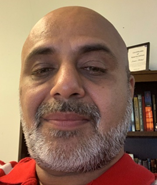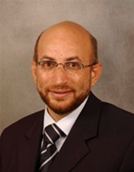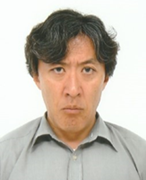


Prof. Aman Behal
University of Central Florida, USA
Biography: Aman Behal received the 5-year integrated M.Tech degree in EE from IIT Bombay, India, in 1996 and a Ph.D. in controls and robotics from Clemson University, Clemson, SC, in 2001. After a brief stint as a post-doctoral associate in Bioengineering at Clemson University, he joined the faculty of the ECE Department at Clarkson University, Potsdam, NY in 2003. In 2006, he joined the University of Central Florida, Orlando, FL where he is currently a Professor jointly with the ECE Department and the NanoScience Technology Center. His current research interests include assistive robotics and nonlinear controls. He serves as an Associate Editor on the Editorial Board of the IEEE Transactions on Control Systems Technology. He has previously served as an Associate Editor for the IEEE Transactions on Cybernetics. He is the lead for the Disability, Aging, and Technology cluster funded under the Faculty Cluster Initiative at the University of Central Florida.
Speech Title: "Assistive Robotics: Challenges and Opportunities"
Abstract: A large number of individuals with disabilities require assistance for moving around and interacting with their surroundings. Nearly two-thirds of mobility device users have limitations in one or more Instrumental Activities of Daily Living such as grocery shopping, telephone use, meal preparation, light housework, etc. Over the past few years, assistive robotic devices have emerged to augment the functional capacity of disabled individuals. There are several mobile collaborative personal and professional service robots available on the market. Advanced sensing/actuation, machine learning, parallel processing, and social networking are combining to offer exciting opportunities for collaborative human-robot interaction and mixed human-robot networks for efficient propagation and sharing of skills. However, there are challenges associated with robot situational awareness, accurate transfer of user intent in the presence of sensory, motor, and/or cognitive deficits in individuals with disabilities, as well as ethical and privacy issues arising from interaction of networked robots, software agents, and people. This talk will focus on how we can take advantage of the aforementioned opportunities while overcoming these challenges.

Prof. Ashraf Elnagar
University of Sharjah, UAE
Biography: Ashraf Elnagar is a Professor of Artificial Intelligence in the Department of Computer Science at the University of Sharjah, UAE. He received his BSc and MSc in Computer Science from the University of Kuwait, Kuwait, and his and PhD (1993) from the University of Alberta, Canada. During his service at the University of Sharjah, he held several administrative positions. He served as founding chair of the Department of Computer Science, chair of the MIS department, Dean of the Community College. Recently, he formed the Machine Language & Arabic Language Processing Research Group in the University of Sharjah. He won a number of teaching, research and community and professional service awards. He is the recipient of the 1999 Shoman’s Best Young Researcher Award in the fields of Mathematics, Computer Science and Statistics in the Arab World. He supervised and examined numerous graduate students. He is serving on the editorial board of international journals as well as technical program committees of international conferences. His research interests include: machine learning, natural language processing, intelligent systems (robotics), and IT education.

Prof. Chiharu Ishii
Hosei University, Japan
Biography: Chiharu Ishii received his PhD in Mechanical Engineering from Sophia University, Japan in 1997. He worked at Ashikaga Institute of Technology between 1997 and 2002, at Kogakuin University between 2002 and 2009, and at Shibaura Institute of Technology between 2009 and 2010. He has been working at Hosei University since 2010, and currently working as a Professor with the Department of Mechanical Engineering, Faculty of Science and Engineering at Hosei University. Dr. Chiharu Ishii has received several awards such as The Best Paper Award in the area of Tactile and Haptic Interfaces at the 4th International Conference on Human System Interaction (HSI 2011); Best Paper Award at the 1st International Conference on Computer Science, Electronics and Instrumentation (ICCSE 2012); Best Presentation Award at the International Conference on Intelligent Mechatronics and Automation (ICIMA 2013); Excellent Oral Presentation Award, at the 4th International Conference on Soft Computing & Machine Intelligence (ISCMI 2017), Best Presentation Award, at the 2nd International Conference on Control, Robotics and Informatics (ICCRI 2019). He is currently a member of IEEE, SICE, JSME, RSJ, IEEJ and JSCAS. His research interests are in medical robotics, assistive technology and robust control.
Speech Title: "Development of Power Assist Suits for Aging Society"
Abstract: Recently, aging of society is progressing rapidly all over the world. Therefore, needs of nursing care for elderly people are increasing. In practice, however, 80% of caregivers have low back pain due to the nursing care such as transfer work. To help caregivers, many kinds of power assist suits have been developed, so far. However, conventional power assist suits have the following problems. Those are heavy, expensive and hard to put on the suit. Therefore, by following advices from caregivers who are working in nursing home, we developed a vest type power assist suit for the purpose of practical use in nursing care. The newly developed assist suit was termed "Cool Vest", which has characteristic that is lightweight, low cost and easy to put on and take off. On the other hand, also in agriculture or the construction site, low back pain becomes a problem due to aging of the worker. Therefore, we developed an outdoor type power assist suit to ease the burden on the waist for work in a half sitting posture, which was termed "Aero Back". Aero Back is commercially available now. In addition, other assist suits developed in my Laboratory, such as leg part exoskeleton and arm part exoskeleton for rehabilitation, and assist suit for walking support, are also introduced.